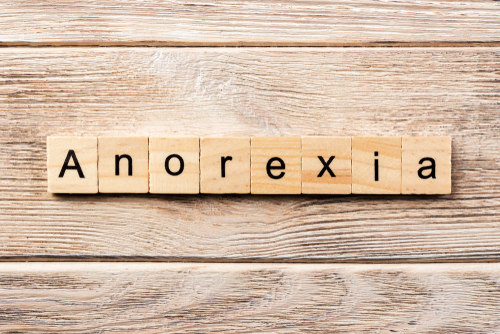Anorexia nervosa, often referred to as anorexia, is listed in the Diagnostic and Statistical Manual of Mental Disorders, Fifth Edition (DSM-5) as an eating disorder. According to the Mayo Clinic, anorexia is “characterized by an abnormally low body weight, an intense fear of gaining weight and a distorted perception of weight.” Though anorexia can manifest at any age, research suggests it most commonly develops during adolescence. Individuals that struggle with anorexia engage in a cycle of self-starvation that often results in malnutrition including a lack of essential minerals and nutrients. The list of adverse short and long-term effects of anorexia is extensive, and without proper treatment anorexia can lead to life-threatening consequences.
Diagnostic Criteria
Obtaining an accurate diagnosis is essential to the recovery process for any mental health illness. Though the symptoms of anorexia can become visibly evident, a diagnosis of anorexia nervosa is reached through a thorough physical and psychological exam. Further, the evaluating provider considers the diagnostic criteria for anorexia, provided by the Diagnostic and Statistical Manual of Mental Disorders, Fifth Edition (DSM-5). To be diagnosed with anorexia nervosa, according to the DSM-5, the following criteria must be met:
- Restriction of energy intake relative to requirements, leading to a significantly low body weight in the context of age, sex, developmental trajectory, and physical health. Significantly low body weight is defined as a weight that is less than minimally normal, or for children and adolescents, less than that minimally expected.
- Intense fear of gaining weight or of becoming fat, or persistent behavior that interferes with weight gain, even though at a significantly low weight.
- Disturbance in the way in which one’s body weight or shape is experienced, undue influence of body weight or shape on self-evaluation, or persistent lack of recognition of the seriousness of the current low body weight.
Atypical anorexia is diagnosed when an individual meets the above criteria but despite significant weight loss, is not medically considered underweight. It is important to note that an individual may still be struggling with a serious eating disorder even if all of the DSM-5 criteria for anorexia are unmet.
Treatment
Every individual is different and will require a tailored treatment plan when it comes to recovering from anorexia. Treatment plans often include a multidisciplinary approach. According to the Mayo Clinic a clinical treatment team for an individual diagnosed with anorexia could include doctors, mental health professionals and dietitians. Depending on the nuanced needs of the individual, the treatment process could include any combination of the following components:
- Inpatient treatment: intensive, inpatient treatment can help address severe malnutrition and other physical health complications that have developed from one’s eating disorder, settings could include:
- Hospitalization
- Inpatient facility
- Psychotherapy: there are a variety of therapeutic modalities used to help treat individuals with anorexia, such as cognitive behavioral therapy (CBT), dialectical behavior therapy (DBT), interpersonal psychotherapy, psychodynamic psychotherapy, creative arts therapies, and more.
- Medications: certain medications (e.g. antipsychotic: Zyprexa) can be prescribed to help with weight gain
- Nutrition counseling: used to help individuals learn how to restore normal eating patterns and teach a healthy approach to weight and food
The Mayo Clinic asserts, “One of the biggest challenges in treating anorexia is that people may not want treatment.” Although anorexia is a considered to be a chronic disorder, with proper treatment an individual can learn how to effectively manage its symptoms and go to on lead a healthy and fulfilling life.
Disclaimer:
The information above is provided for the use of informational purposes only. The above content is not to be substituted for professional advice, diagnosis, or treatment, as in no way is it intended as an attempt to practice medicine, give specific medical advice, including, without limitation, advice concerning the topic of mental health. As such, please do not use any material provided above as a means to disregard professional advice or delay seeking treatment.




